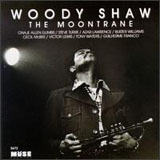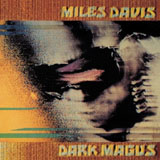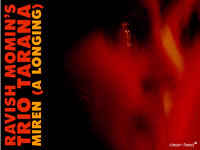Home » Jazz Articles » Interview » Azar Lawrence: Rising Like Atlantis
Azar Lawrence: Rising Like Atlantis
It's just getting out of the way and letting the Most High come through. That's all it is.
 It's an uncharacteristically quiet Friday night at Los Angeles' World Stage, but that's about to change. Recent 2007 appearances here and up the street at 5th St. Dick's have served notice that saxophonist Azar Lawrence is back. One of the brightest young stars of the late seventies, Lawrence found regular employment with Elvin Jones, Miles Davis and McCoy Tyner, to name a rarified few. After burning his way through three solo albums, his name dropped from the jazz annals until his reemergence in Leimert Park.
It's an uncharacteristically quiet Friday night at Los Angeles' World Stage, but that's about to change. Recent 2007 appearances here and up the street at 5th St. Dick's have served notice that saxophonist Azar Lawrence is back. One of the brightest young stars of the late seventies, Lawrence found regular employment with Elvin Jones, Miles Davis and McCoy Tyner, to name a rarified few. After burning his way through three solo albums, his name dropped from the jazz annals until his reemergence in Leimert Park. Having Benny Golson's son, Reggie, as a close childhood friend gave the young Lawrence a close look at a musician both respected and influential in the jazz world, who also took advantage of the many opportunities available to an LA artist. Soon the fiery tenor virtuoso found himself in demand at movie studios, as well as writing and arranging for funk/soul bands. Not such a stretch, remembering his first jobs with Ike & Tina Turner, Eric Burdon & War, Marvin Gaye, and the Watts 103rd St Rhythm Band.
By the time he unpacks and assembles his tenor, the modest room has filled with an eclectic crowd, many returning fans. Coming up at a time when every young strong original player had to endure "the New Coltrane collar, Lawrence still embraces and celebrates his legacy. The program features several Coltrane classics, as well as Ellington and Tyner beauties. On each, the tenor player hungrily finds new ways and original approaches with even greater speed and power than his younger self demonstrated with Tyner blowing the roof off the cavernous Royce Hall thirty years ago. Here in the small confines of the Stage, after this musical blast furnace finishes people must peel themselves off the walls.
When his crackling quartet—including pianist Michael Andrews, drummer Gerald Ballard and bassist Lester McFarland—play the opening chords of "My Favorite Things, you wonder what tricks Lawrence can possibly ring out of the old dog. But, he throws open a vault, exposing a treasure trove of undiscovered riches. With the rhythm section at his back like stampeding bulls, Lawrence plays for his life, like a man on fire. He recently recorded with Jesse Sharps, Roberto Miranda, Ndugu Chandler, and others in a large group called The Gathering, and filmed a performance for Time/Warner that's due to be broadcast. A new solo album is in the works.
AAJ: You were born in LA?
AL: Yeah, we lived at Avalon and 47th, then we moved to Baldwin Hills. We were one of three black families living there at that time. Tommy Davis, the Willie Mays of the Dodgers, and Louis Jordan was a neighbor as well. My mother was a pianist and a music teacher. She made sure I practiced. I started playing violin when I was five. My brother and I played violin in the USC Junior Orchestra. I switched to the alto saxophone at eight.
AAJ: Was your dad a musician too?
AL: No, he bought me my instruments. When I needed an alto he bought me a Selmer. He got the top of the line, whatever it was I needed. A guy named Raymond Pound, the drummer on Marvin Gaye's Trouble Man (Motown, 1972) album, he said, "You might as well switch to a man's instrument and play tenor. As soon as I did I started working.
AAJ: What was it like playing with Ike & Tina?
AL: It was just a recording session. It was nice. Tina was so laid back. I didn't know it was her. She came in with groceries, just like a little house wife, until she came out with her wig on, and that short dress.
AAJ: What record was it?
AL: I don't even know what the name of it was. We recorded a bunch of stuff. Ike used to have a studio, Bolic Sound, over on La Brea. I recorded a Marvin Gaye album, too, Here, My Dear (Motown, 1978).
 AAJ: How'd you connect with Elvin [Jones]?
AAJ: How'd you connect with Elvin [Jones]? AL: Reggie Golson, Benny Golson's son, was a very good friend of mine, and he and Elvin were close. In fact, Elvin had given him a drum set. So, he told Elvin about me, and that's how it happened.
AAJ: Had you already been hit by Coltrane when you started playing with Elvin?
AL: Oh, yeah. Reggie Golson was instrumental in my listening to that stuff. He had a large collection and every day we'd go listen to records. He lived next door to Davy Jones of the Monkees, up in the Hollywood Hills. He was a nice guy, too.
Benny Golson, great saxophonist, wrote for a lot of the TV shows, so they were doing quite well, and lived up there. So, we would go up there and Reggie would put different artists on, and I'd say, "Who's this? Who's that? So I knew all the music. Some of it was bootlegs, stuff that's out now, but wasn't out then. I heard them through Reggie, he had copies of them. I never did ever take my horn and play along. As McCoy would say, I felt the same way about the music as John.
So after Elvin I went with McCoy. I'd wanted to be with McCoy from the very beginning. The summer before I went with Elvin, I drove up to San Francisco with my wife at the time and McCoy was playing at the Keystone Korner. We took a nap after the drive and woke up at 1:30, by the time we got there they'd just played the last note. But then every time Elvin and us would be in town in NY in Manhattan, McCoy was out of town. I never got a chance to hook up.
So, they were off one time and we were playing the Village Vanguard with Elvin and Alphonse Mouzon came down and heard Elvin and told McCoy about me, and so we were off the next week and they came into the Vanguard and McCoy sent a message for me to come down and play-sit in. So, I went down and sat in and that's how the magic happened.
AAJ: He called you when Sonny moved on?
AL: He called me a few days later.
AAJ: How long were you with McCoy?
AL: I was with him for five-and-a-half years.
AAJ: And how many albums did you record with him?
AL: Four or five, I know we did at least four.
AAJ: Your mom schooled you on music theory?
AL: She sure did. I was a science major in high school. But I did a lot of performing things. I played with the Jazz Workshop. I went to Jordan High School. The Jazz Workshop was teachers—very, very good. We performed at battles of the bands. I played with Horace Tapscott. In 1969, we use to play every Sunday at 3:00 pm. I wrote a song called "Tapscott's Blues that's on Woody Shaw's Moontrane (Muse, 1974) album. Woody Shaw was on my first album.
AAJ: You guys paired up a lot.
AL: Yeah, we did. Back in 1970, Larry Gales and Candy Finch, a drummer who used to play with Dizzy Gillespie, had an after-hours club on 54th St. in Los Angeles. Tuesdays and Thursdays and I would play with Larry and Candy Finch on drums, and Rose Gales played piano, sometimes it was Billy Higgins, and sometimes Woody Shaw would play. One of the fabulous blessings along the way. And then, Mtume used to play, he did a series of records before he really became big and famous.
I met Mtume in Los Angeles in '68, he was playing with a conga player named Big Black. We became really good friends. He did a series of projects himself that he funded and recorded in White Plains, New York. I would pick up Dee Dee Bridgewater at the Port Authority, and she'd drive with me up there to his father's, which was Jimmy Heath. He was on all my albums on Fantasy. Mtume was close to Miles Davis. He would come down when I was in town with McCoy and bring Miles. And afterwards Miles would come up and say, "You sound good. That's what led to my recording with him, we recorded the Dark Magus (Columbia, 1974) album live at Carnegie Hall.
AAJ: How long did you work with Miles?
 AL: Well, he wanted me to join the group, but McCoy and I were really close. I didn't want to leave McCoy just then. So, I told Miles, "Neither one of you guys works that much, maybe I'll work with both of you. And Miles said, "I hope it works out for you.
AL: Well, he wanted me to join the group, but McCoy and I were really close. I didn't want to leave McCoy just then. So, I told Miles, "Neither one of you guys works that much, maybe I'll work with both of you. And Miles said, "I hope it works out for you. AAJ: What was he like?
AL: Just phenomenal, to say the least. I learned so much, in three nights I got forty years of experience.
AAJ:I heard by that point in the electric thing it was getting pretty free. Was it easy to step into that?
AL: Yeah, you know it was easy to step into that, but no easier than McCoy. If you're on the level of it, then it is easy. If you're there, you're there. One guy sat in with us who I'd looked up to for many years. To me, he was like Dolphy, but he walked onstage, and I realized how big the music is. Playing with a guy like McCoy, or Elvin, they played with Trane. I saw him come to it, like he'd shrunk up to about five feet. He was gone, I couldn't even see him. Looked down there he was playing a little, "tee, tee, tee.
Another friend of mine played drums with McCoy and rehearsed, everything was cool, but we got to the job and you could hear the music and you couldn't hear the drums. Drums are the loudest thing up there. So that's how big the music is, on that level. If you're there with it, then you gotta be big with it.
AAJ: Do you play soprano anymore?
AL: Actually I'm going to be doing some things, recording with the soprano. I just figured the tenor was such a life's endeavor, if I could just play that well... I'm getting ready to record a new album. We're going to start recording next month. We're going to use the band from the other night, Lester, Gerald, Michael. It was fun playing with Nate Morgan that night. Nate and I grew up together.
AAJ: Any word of your three solo records coming back out?
AL: No word as of yet, but a lot people ask me about them.
AAJ: Where did you go from there?
AL: I was on the writing staff of Screen Gems. I wrote "Heart to Heart, "Freedom of Choice, and "Spread Your Love on the Earth, Wind, and Fire Powerlight (Columbia, 1983) LP. I wrote with Maurice White and Beloyd Taylor, and played keyboards. Before that I had a little team with Chuck Jackson and Patryce (Chocolate) Banks. I worked with Stanley Turrentine on the Home Again (Elektra, 1983) record, had four songs on that, played keyboards.
AAJ: That's great to navigate successfully through different genres of music.
 AL: It's all music. I was a funkateer before I was branded as jazz. It just happens. I had a group called Starburst that never really got off the ground and I turned that into a group called Chameleon. I did this whole pop thing. But, like Maurice White told me, "There's a lot of saxophone players doing the pop thing, but none of them can do what you do. In fact, I'm working with a hip-hop group.
AL: It's all music. I was a funkateer before I was branded as jazz. It just happens. I had a group called Starburst that never really got off the ground and I turned that into a group called Chameleon. I did this whole pop thing. But, like Maurice White told me, "There's a lot of saxophone players doing the pop thing, but none of them can do what you do. In fact, I'm working with a hip-hop group. We have a record company with a friend of mine named Daud Ford, better known as Dee, in Las Vegas, a company called Deuces Wild Records. We have a project we're working that's hip-hop jazz. Dee's one of the top hip-hop writers, producers, and rappers. In the last few years I've just been playing live, riding on a lot of the things I've done. I did a lot of writing, not just Earth, Wind, and Fire, but motion picture stuff. I was a staff writer for Screen Gems, and also Polygram, just extensive writing.
I lived in Las Vegas for about five or six years. I played with Bobby Hutcherson, played with Cedar Walton. Billy Higgins and I played a lot. We did a movie called Recycler (2001) that's out right now. Billy Higgins, Kito Gamble, Jeffrey Littleton plays bass, Richard Grant plays trumpet, we performed, we played a group called the Egyptians. We played throughout the movie, and we played live and wore these costumes, we looked like Egyptians. Billy had a few lines. Kito Gamble, great piano soloist.
She's from the Bay Area. She sings and she was doing the hip-hop thing. First time I heard her I was doing the jam session at the World Stage. My eyes are closed and somebody else sat down at the piano, and I thought McCoy had come in there, or Alice Coltrane, someone at that level.
AAJ: Where to now, after all the ground you've covered?
AL: I'm playing saxophone, full force. I always wanted to string all these things together and have them working together. So that's where it's really at now. I'm still writing songs to be utilized in other avenues of music. I wrote a song Dolly Parton put a hold on. She didn't end up using it, but I felt very honored she even held it. I pride myself on not only being able to write jazz, but also pop. It's a blessing. It all goes back to my parents, they were there for me.
AAJ: The World Stage's Don Muhammed tapped me on the shoulder after your show and said, "Wasn't that healing?
AL: That's great. Really? It's just getting out of the way and letting the Most High come through. That's all it is.
Selected Discography
Earth, Wind and Fire, Powerlight (Columbia, 1983)
Stanley Turrentine, Home Again (Elektra, 1983)
Freddie Hubbard, Bundle of Joy (Columbia, 1977)
Azar Lawrence, People Moving (Prestige, 1976)
Azar Lawrence, Summer Solstice (Prestige, 1975)
Elvin Jones, New Agenda (Vanguard, 1975)
McCoy Tyner, Sama Layuca (Milestone, 1975)
Woody Shaw, Moontrane (Muse, 1974)
Miles Davis, Dark Magus (Columbia, 1974)
McCoy Tyner, Atlantis (Milestone, 1974)
McCoy Tyner, Enlightenment (Milestone, 1973)
Photo Credit Courtesy of Azar Lawrence
Tags
PREVIOUS / NEXT
Support All About Jazz
 All About Jazz has been a pillar of jazz since 1995, championing it as an art form and, more importantly, supporting the musicians who make it. Our enduring commitment has made "AAJ" one of the most culturally important websites of its kind, read by hundreds of thousands of fans, musicians and industry figures every month.
All About Jazz has been a pillar of jazz since 1995, championing it as an art form and, more importantly, supporting the musicians who make it. Our enduring commitment has made "AAJ" one of the most culturally important websites of its kind, read by hundreds of thousands of fans, musicians and industry figures every month.





















